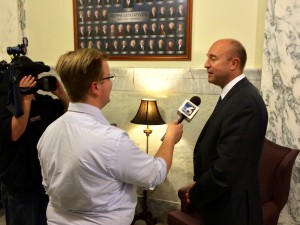As the 2015 legislative session spilled briefly into Saturday morning — arguably, its 90th day in business — Rep. Reed DeMordaunt received compliments from both sides of the aisle.
House Minority Leader John Rusche of Lewiston and Senate Majority Leader Chuck Winder of Boise sought out DeMordaunt. The Eagle Republican and chairman of the House’s Education Committee was a key player in the session’s centerpiece education bill, a five-year, $125 million career ladder to boost teacher pay.

After two failed drafts, and a bill that was sharply criticized during a five-hour public hearing, the third version of the bill ultimately achieved widespread consensus. The bill passed with the blessing of Gov. Butch Otter, education groups and overwhelming majorities in both houses.
“From a funding standpoint we obviously met the governor’s goal and objective,” DeMordaunt said early Saturday morning. “(And) we had a lot of thorough discussion about where those monies are being invested.”
What passed in the 13-week session? And what are the implications for Idaho education? Here’s what the 2015 legislative session means …
… for starting teachers. Under the career ladder, entry-level pay will increase from $31,750 to $32,700.
… for teachers elsewhere on the pay scale. The career ladder is designed to increase salaries across the board. For residency teachers in their first three years in the profession, pay will eventually increase to $37,000 to $39,000. For professional teachers, with more than three years of experience, pay will increase $42,500 to $50,000.
… for cash-strapped school districts. The Legislature boosted “operational spending” for schools — the discretionary line item that can be used to hire teachers, cover health insurance costs or pay utility bills. The Legislature increased per-classroom operational spending from $22,401 to $23,868 — although this still lags behind 2008-09 levels of $25,696.
… for high school broadband. Districts are still on their own to find ways to replace the defunct Idaho Education Network system. The state is setting aside $6.3 million to reimburse districts for their broadband contracts. Meanwhile, lawmakers will put together an “interim committee” to study the broadband issue during there off-season.
… for Schoolnet. The troubled instructional management system is going by the boards. The state will put $985,000 into one-time funding for the statewide system, to help the districts that have managed to make Schoolnet work. This is a decrease from $2.5 million in 2014-15 — and the state will set more money aside for districts to find more money.
… for pre-kindergarten advocates. Another bill to set up a pre-K pilot program was introduced in the House Education Committee, but it went no farther. But some lawmakers believe a “pay for success” contracts law will encourage private entities to take up the early childhood education mantle — in hopes of receiving state funding if their programs meet education benchmarks.
… for high school students who want to get ahead. The Legislature set aside $6 million to help cover dual-enrollment college courses.
… for students (and parents) who are worried about bullying. A new law is aimed at helping schools and their staff better address harassment and intimidation. The law emphasizes training for staff, and requires districts to write their own anti-bullying policies.
… for parents. The Legislature considered a couple of bills designed to assert parental rights in education and health care decisions. The law that passed says, in part, “Parents who have legal custody of any minor child or children have the fundamental right and duty to make decisions concerning their education.”
… for the class of 2017. A new graduation requirement is on its way. Students will need to pass a civics test in order to graduate high school.
… for STEM education. The state created an “action center” to promote the STEM learning disciplines of science, technology, engineering and math, and put $647,300 into the startup.
… for school board candidates. Starting in July, many school board candidates will have to fill out the same campaign finance reports required of legislative and statewide candidates. Candidates in smaller districts are exempt from the new requirement.
… for Ilah Hickman. After five years of trying, the Boise eighth-grader convinced and cajoled legislators to make the Idaho giant salamander the state’s official amphibian. Otter signed the bill last week.
